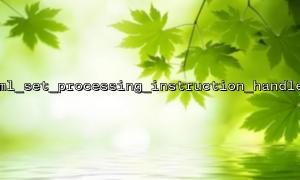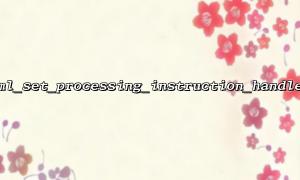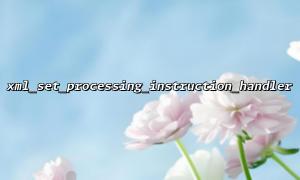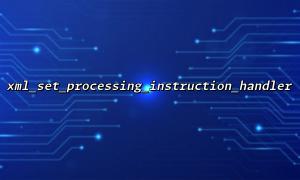When handling XML data in PHP, you often encounter various scenarios, one of which is the need to process Processing Instructions within XML. If you are parsing an XML file and want to perform custom actions on specific processing instructions during parsing, the xml_set_processing_instruction_handler function comes into play.
In an XML document, processing instructions are a special structure typically used to provide instructions to applications that are not part of the XML data content. The syntax for processing instructions is as follows:
<?target data?>
target refers to the target of the instruction.
data is the data attached to the instruction target.
For example, here is a processing instruction in an XML document:
<?php echo "Hello, World!"; ?>
This instruction tells the processor to execute PHP code, but it is not part of the XML data itself.
When parsing XML documents, PHP does not pay special attention to processing instructions by default unless you specify how to handle them. This is where xml_set_processing_instruction_handler becomes useful. With this function, you can register a callback that will be invoked whenever a processing instruction is encountered during parsing. This allows you to customize how processing instructions are handled instead of simply skipping over them.
The signature of the xml_set_processing_instruction_handler function is as follows:
bool xml_set_processing_instruction_handler(resource $parser, callable $handler)
$parser: The XML parser resource created by xml_parser_create().
$handler: A callback function that will be called when a processing instruction is encountered during parsing.
The callback function receives two parameters:
$target: The target of the processing instruction (the target part in XML).
$data: The content of the processing instruction (the data part in XML).
Here is a simple example showing how to use xml_set_processing_instruction_handler to handle processing instructions in XML:
<?php
<p>// Create an XML parser<br>
$parser = xml_parser_create();</p>
<p>// Define the callback function for processing instructions<br>
function handle_processing_instruction($target, $data) {<br>
echo "Processing instruction target: $target\n";<br>
echo "Processing instruction data: $data\n";<br>
}</p>
<p>// Set the processing instruction handler<br>
xml_set_processing_instruction_handler($parser, 'handle_processing_instruction');</p>
<p>// XML string to parse<br>
$xml = '<?xml version="1.0" encoding="UTF-8"?></p>
<?php echo "Hello, World!"; ?>
<p><note><br>
<to>Tove</to><br>
<from>Jani</from><br>
<heading>Reminder</heading><br>
<body>Don't forget me this weekend!</body><br>
</note>';</p>
<p>// Parse the XML<br>
if (!xml_parse($parser, $xml, true)) {<br>
die(sprintf("XML parsing error: %s at line %d", xml_error_string(xml_get_error_code($parser)), xml_get_current_line_number($parser)));<br>
}</p>
<p>// Free the parser<br>
xml_parser_free($parser);<br>
?><br>
Processing instruction target: php
Processing instruction data: echo "Hello, World!";
In this example, the processing instruction <?php echo "Hello, World!"; ?> in the XML is captured and handled by the callback function, which outputs the target and data of the instruction.
In real development scenarios, processing instructions can be used to control the processing flow of XML files or to pass dynamic data to applications. Using xml_set_processing_instruction_handler allows you to easily handle these instructions and execute any logic you need.
For example, if you are dealing with an XML file containing dynamic instructions where processing instructions specify certain configuration items or control behaviors, you can parse these instructions with a custom callback and perform corresponding actions as needed.
When using xml_set_processing_instruction_handler, make sure your callback function correctly handles each instruction's target and data.
If your XML document contains multiple processing instructions, the callback will be executed once for each instruction.
Always free the parser after parsing to avoid memory leaks.
xml_set_processing_instruction_handler provides PHP developers with a flexible way to manage processing instructions during XML parsing. By registering a callback, you can customize how processing instructions are handled according to your needs, enabling more complex XML data parsing behavior. This makes PHP more efficient and adaptable when working with XML documents that have special processing requirements.
Related Tags:
XML


